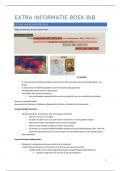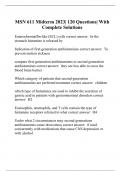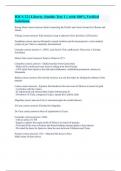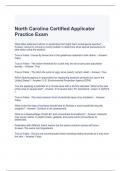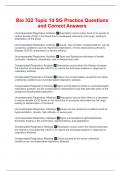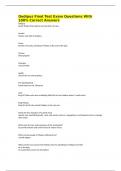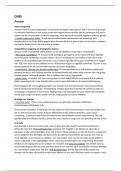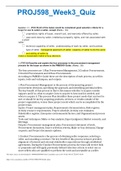C1 What is organizational behaviour?
There is a connection between the quality of the workplace relationship with the employee and
the job satisfaction, life improvement, lower stress, better performance.
Worker = an individual who contributes to the accomplishment of work goals. The gig economy is
something that changed the definition of a worker. Now they need more skills that 30 years ago.
Now you have: contract workers, independent contractors, freelancers and temporary workers. It
comes with financial instability, job insecurity, autonomy, career path uncertainty and physical and
relational separation. The gig economy emerged after 2008 (global recession).
Organization = a consciously coordinated social unit, composed of who or more people, that
functions on a relatively continuous basis to achieve a common goal/set of goals. Also schools,
hospitals, churches, military units, police departments and government agencies.
Manager = an individual who achieves goals through other people. Sometimes called
administrators in non-profit organizations.
Management activities:
- Planning: a process that includes defining goals, establishing strategy and developing
plans to coordinate activities
- Leading: a function that includes motivating employees, directing others, selecting the
most effective communication channels and resolving conflicts
- Controlling: monitoring activities to ensure that they are being accomplished as planned
and correcting any significant deviations
- Organizing: structuring a work unit, determining what tasks are to be done, who is to do
them, how the tasks are to be grouped, who reports to whom, and where decisions are to
be made
Management skills:
- Technical skills: ability to apple specialized knowledge or expertise
, - People skills: the ability to work with, understand and motivate other people, both
individually and in groups. Done by great listening skills
- Conceptual skills: the mental ability to analyse and diagnose complex situations. Identify
problems, develop alternative solutions, evaluate those solutions and select the best one
Luthans’ study: difference between an effective versus a successful manager. Four managerial
activities were found:
1. Traditional management: decision making, planning and controlling
2. Communication: exchanging routine info and processing paperwork
3. Human resources (HR) management:
4. Networking: socializing, politicking and interacting with outsiders
Organizational behaviour (OB) = a field of study that investigates the impact that individuals,
groups and structures have on behaviour within organizations for the purpose of applying such
knowledge toward improving an organization’s effectiveness = the study of what people do in an
organization and how their behaviour affects the organization’s performance, concerned with
employment-related situations as:
- Performance, citizenship, deviance and creativity
- Diversity and inclusion
- Job attitudes, emotions and moods
- Personality and individual differences
- Judgement and decisions making
- Motivation
- Justice and ethics in organizations
- Groups and teams
- Communication and relationships
- Leadership and management
- Power, politics and corruption
- Conflict and negotiation
- Organizational theory and structure
- Organizational culture and climate
- Organizational health, stress and safety
Humans are able to identify consistencies in underlying people’s behaviour, because people are
predictable and by systematic study we can reason accurate predictions. This study is
complemented by evidence-based management (EBM) by basing managerial decisions on the
best available scientific evidence (just like when doctors base medication on the latest results).
Intuition (gut feelings) is an instinctive feeling not necessarily supported by research – not always
incorrect, but data driven decisions tend to be more accurate. The trick is the know when to do
with your gut. We tend to overestimate what we think we know and hold on to these decisions,
even when empirical evidence points at the other direction.
,Big data enables companies to create more targeted marketing strategies, such as with the
bookselling industry, where bookstores can collect data about book sales and costumers’ interests
and trends. Amazon is also an example with information about preferences, what people bought,
saw, reviewed, navigated and it enables tracking. It’s important to know that statistics are
persistent – which ones give constant outcomes, so that things become predictive. Statistics are
used to create algorithms. With that, we can predict and prevent. Insurance firms predict
behaviour to assess risks, such as the change of traffic accident. Through artificial intelligence
companies are able to process massive amounts of data. More and more, there is a focus on
machine learning with e-commerce. But with technology comes privacy issues.
Conclusion: do not throw your intuition out of the window, but don’t also base all your decisions on
a machine learning algorithm, but use evidence as much as possible to inform your decisions.
Several behavioural sciences do research to OB. Such as:
- Psychology: the science that seeks to measure, explain and sometimes change the
behaviour of humans and other humans
- Social psychology: an area of psychology that blends concepts from psychology and
sociology to focus on the influence of people on one another
- Sociology: the study of people in relation to their social environment or culture
- Anthropology: the study of societies to learn about human beings and their activities
Because everyone acts different in the same situations, we can only draw predictions under
contingency variables = situational factors or variables that moderate the relationship between
two or more variables. Watch out for generalizations.
It’s important to manage:
- Workplace diversity = the heterogeneous characteristics of organizations, work groups, and
teams the recognize that their workers vary in gender, age, race, ethnicity, sexual
orientation and other characteristics as socioeconomic status
- Workforce inclusion = the act of creating and maintaining workplaces that support and
leverage the diversity of their members
Globalization = the process in which worldwide integration and interdependence are promoted
across national borders → has led to leaders and employees becoming increasingly connected,
but also a growing contrast between first world countries and poorer ones due to the industrial
revolution. Once you start working outside your home country (= expatriate), you come in contact
with different workforces with other aspirations, needs and attitudes, because of the different
country. Because people can work from home/holiday destination nowadays, many don’t feel
part of a team anymore. The sense of belonging is challenging for virtual workers. Employees today
have to be ‘always-on’, which leads to burnouts. People want jobs that give them flexibility in their
work schedules to manage work/life responsibilities better.
Corporate social responsibility (CSR) = an organization’s self-regulated actions to benefit society or
the environment beyond what is required by law, done by: sustainability initiatives, non-profit work,
volunteering, charitable giving etc. CSR is good for the planet and is has a positive effect on
attitudes, turnover intentions and performance. This generation of employees seek for focus on
people, planet and profit. To be most effective, organizations have to address a few issues:
1. Not all projects are equally meaningful for every person
2. Some organizations require employees to contribute in a prescribed manner
3. CSR measures can seem disconnected from the employee’s actual work
Positive organizational scholarship = an area of OB research that studies how organizations
develop human strengths, foster vitality, build resilience and unlock potential
, Model = abstraction of reality, a simplified representation of some real-world phenomenon
Inputs = variables like personality, group structure and organizational culture that lead to processes
Processes = actions that individuals, groups and organizations engage in as a result of inputs and
that lead to certain outcome
Outcomes = key factors that are affected by other variables
- Attitudes and stress
- Job performance (total value of your contributions to an organization)
- Organizational citizenship behaviour (OCB) (behaviour that contributes to the
psychological and social environment of the workplace, this is not in the job description,
but wanted by managers) → people who are more satisfied with their job, tend to be more
likely to engage in citizenship behaviour (vriendelijk en behulpzaam gedrag?)
o Talking positively about the organization
o Helping others
o Going beyond their job’s typical expectations
- Withdrawal behaviour (set of actions people take to separate themselves from the
organization → unethical behaviour? Quitting, however, is not bad, because it is a natural
selection, where the poor performers leave and the strong ones stay)
- Team performance (quantity and quality of a team’s work output)
- Productivity (combination of the effectiveness and efficiency of an organization)
- Survival (the degree to which an organization can exist and grow over the long term.
Depends on the productivity of the making goods and services)
There is a connection between the quality of the workplace relationship with the employee and
the job satisfaction, life improvement, lower stress, better performance.
Worker = an individual who contributes to the accomplishment of work goals. The gig economy is
something that changed the definition of a worker. Now they need more skills that 30 years ago.
Now you have: contract workers, independent contractors, freelancers and temporary workers. It
comes with financial instability, job insecurity, autonomy, career path uncertainty and physical and
relational separation. The gig economy emerged after 2008 (global recession).
Organization = a consciously coordinated social unit, composed of who or more people, that
functions on a relatively continuous basis to achieve a common goal/set of goals. Also schools,
hospitals, churches, military units, police departments and government agencies.
Manager = an individual who achieves goals through other people. Sometimes called
administrators in non-profit organizations.
Management activities:
- Planning: a process that includes defining goals, establishing strategy and developing
plans to coordinate activities
- Leading: a function that includes motivating employees, directing others, selecting the
most effective communication channels and resolving conflicts
- Controlling: monitoring activities to ensure that they are being accomplished as planned
and correcting any significant deviations
- Organizing: structuring a work unit, determining what tasks are to be done, who is to do
them, how the tasks are to be grouped, who reports to whom, and where decisions are to
be made
Management skills:
- Technical skills: ability to apple specialized knowledge or expertise
, - People skills: the ability to work with, understand and motivate other people, both
individually and in groups. Done by great listening skills
- Conceptual skills: the mental ability to analyse and diagnose complex situations. Identify
problems, develop alternative solutions, evaluate those solutions and select the best one
Luthans’ study: difference between an effective versus a successful manager. Four managerial
activities were found:
1. Traditional management: decision making, planning and controlling
2. Communication: exchanging routine info and processing paperwork
3. Human resources (HR) management:
4. Networking: socializing, politicking and interacting with outsiders
Organizational behaviour (OB) = a field of study that investigates the impact that individuals,
groups and structures have on behaviour within organizations for the purpose of applying such
knowledge toward improving an organization’s effectiveness = the study of what people do in an
organization and how their behaviour affects the organization’s performance, concerned with
employment-related situations as:
- Performance, citizenship, deviance and creativity
- Diversity and inclusion
- Job attitudes, emotions and moods
- Personality and individual differences
- Judgement and decisions making
- Motivation
- Justice and ethics in organizations
- Groups and teams
- Communication and relationships
- Leadership and management
- Power, politics and corruption
- Conflict and negotiation
- Organizational theory and structure
- Organizational culture and climate
- Organizational health, stress and safety
Humans are able to identify consistencies in underlying people’s behaviour, because people are
predictable and by systematic study we can reason accurate predictions. This study is
complemented by evidence-based management (EBM) by basing managerial decisions on the
best available scientific evidence (just like when doctors base medication on the latest results).
Intuition (gut feelings) is an instinctive feeling not necessarily supported by research – not always
incorrect, but data driven decisions tend to be more accurate. The trick is the know when to do
with your gut. We tend to overestimate what we think we know and hold on to these decisions,
even when empirical evidence points at the other direction.
,Big data enables companies to create more targeted marketing strategies, such as with the
bookselling industry, where bookstores can collect data about book sales and costumers’ interests
and trends. Amazon is also an example with information about preferences, what people bought,
saw, reviewed, navigated and it enables tracking. It’s important to know that statistics are
persistent – which ones give constant outcomes, so that things become predictive. Statistics are
used to create algorithms. With that, we can predict and prevent. Insurance firms predict
behaviour to assess risks, such as the change of traffic accident. Through artificial intelligence
companies are able to process massive amounts of data. More and more, there is a focus on
machine learning with e-commerce. But with technology comes privacy issues.
Conclusion: do not throw your intuition out of the window, but don’t also base all your decisions on
a machine learning algorithm, but use evidence as much as possible to inform your decisions.
Several behavioural sciences do research to OB. Such as:
- Psychology: the science that seeks to measure, explain and sometimes change the
behaviour of humans and other humans
- Social psychology: an area of psychology that blends concepts from psychology and
sociology to focus on the influence of people on one another
- Sociology: the study of people in relation to their social environment or culture
- Anthropology: the study of societies to learn about human beings and their activities
Because everyone acts different in the same situations, we can only draw predictions under
contingency variables = situational factors or variables that moderate the relationship between
two or more variables. Watch out for generalizations.
It’s important to manage:
- Workplace diversity = the heterogeneous characteristics of organizations, work groups, and
teams the recognize that their workers vary in gender, age, race, ethnicity, sexual
orientation and other characteristics as socioeconomic status
- Workforce inclusion = the act of creating and maintaining workplaces that support and
leverage the diversity of their members
Globalization = the process in which worldwide integration and interdependence are promoted
across national borders → has led to leaders and employees becoming increasingly connected,
but also a growing contrast between first world countries and poorer ones due to the industrial
revolution. Once you start working outside your home country (= expatriate), you come in contact
with different workforces with other aspirations, needs and attitudes, because of the different
country. Because people can work from home/holiday destination nowadays, many don’t feel
part of a team anymore. The sense of belonging is challenging for virtual workers. Employees today
have to be ‘always-on’, which leads to burnouts. People want jobs that give them flexibility in their
work schedules to manage work/life responsibilities better.
Corporate social responsibility (CSR) = an organization’s self-regulated actions to benefit society or
the environment beyond what is required by law, done by: sustainability initiatives, non-profit work,
volunteering, charitable giving etc. CSR is good for the planet and is has a positive effect on
attitudes, turnover intentions and performance. This generation of employees seek for focus on
people, planet and profit. To be most effective, organizations have to address a few issues:
1. Not all projects are equally meaningful for every person
2. Some organizations require employees to contribute in a prescribed manner
3. CSR measures can seem disconnected from the employee’s actual work
Positive organizational scholarship = an area of OB research that studies how organizations
develop human strengths, foster vitality, build resilience and unlock potential
, Model = abstraction of reality, a simplified representation of some real-world phenomenon
Inputs = variables like personality, group structure and organizational culture that lead to processes
Processes = actions that individuals, groups and organizations engage in as a result of inputs and
that lead to certain outcome
Outcomes = key factors that are affected by other variables
- Attitudes and stress
- Job performance (total value of your contributions to an organization)
- Organizational citizenship behaviour (OCB) (behaviour that contributes to the
psychological and social environment of the workplace, this is not in the job description,
but wanted by managers) → people who are more satisfied with their job, tend to be more
likely to engage in citizenship behaviour (vriendelijk en behulpzaam gedrag?)
o Talking positively about the organization
o Helping others
o Going beyond their job’s typical expectations
- Withdrawal behaviour (set of actions people take to separate themselves from the
organization → unethical behaviour? Quitting, however, is not bad, because it is a natural
selection, where the poor performers leave and the strong ones stay)
- Team performance (quantity and quality of a team’s work output)
- Productivity (combination of the effectiveness and efficiency of an organization)
- Survival (the degree to which an organization can exist and grow over the long term.
Depends on the productivity of the making goods and services)




